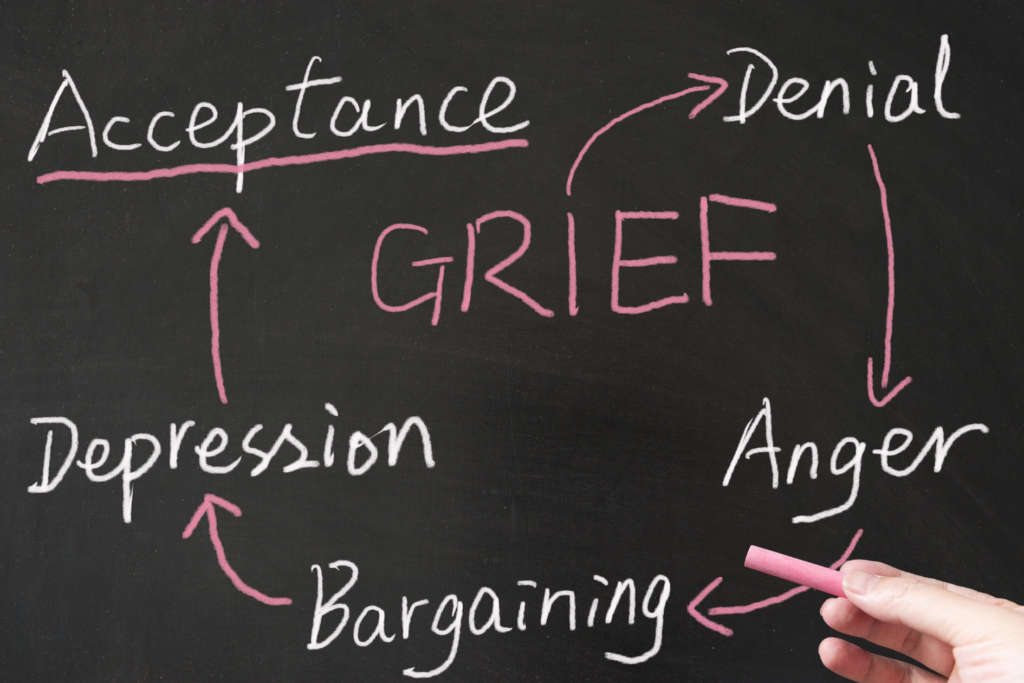Losing a loved one is an experience that no one can fully prepare for, and when that loss occurs after a period of care in hospice, it can add unique layers of complexity to the grieving process.
The journey through grief is deeply personal and often overwhelming, with a series of stages and emotions that vary from person to person. In this blog, we’ll explore the different stages of loss and grief of a loved one that individuals may encounter after the passing of a loved one who was in hospice care.
We hope to provide support, insights, and guidance to help you cope with the profound emotions and challenges during this difficult time.
What Are the 5 Stages of Loss & Grief?

The five stages of grief were first introduced by psychiatrist Elisabeth Kübler-Ross in her 1969 book “On Death and Dying.” The stages are not meant to be a strict linear sequence that every person follows in the same order or for the same duration. Instead, they offer a framework for understanding the common emotional responses people may experience when dealing with loss and grief. It’s believed that if you know the stages of grief, you’ll be better equipped to navigate them.
The five stages of grief are denial, anger, bargaining, depression, and acceptance.
Stage 1: Denial
During the denial stage, individuals may exhibit the following emotions and behaviors:
- Numbness: Emotional numbness as if the mind and body are trying to protect themselves from the pain.
- Disbelief: Difficulty believing the loss has occurred, leading to a sense of unreality.
- Confusion: A state of mental and emotional confusion as one tries to make sense of the situation.
- Emotional detachment: Withdrawing from social interactions and isolating oneself from others.
- Avoidance: Avoid reminders or discussions related to the loss to shield themselves from the pain.
Copy with denial can be challenging, but here are some strategies and support networks that can be helpful:
- Acknowledge your feelings: Recognize that denial is a natural response to grief. It’s okay to feel this way, and it doesn’t mean you’re weak.
- Seek support: Connect with friends, family, or a support group that can provide a safe space to express your feelings and validate your experiences.
- Invest in professional help: Consider therapy or counseling to work through these initial feelings of denial and isolation, as a trained therapist can provide guidance and tools to help you process your grief.
- Self-care: Pay attention to your physical and emotional well-being. Engage in activities that bring comfort, like exercise, meditation, or creative outlets.
- Take it one step at a time: Grief is a process. Allow yourself the time and space to accept the reality of your loss gradually.
Stage 2: Anger
Anger is a natural part of the grieving process and typically follows the initial denial stage. During this stage, individuals experience intense frustration, resentment, and anger in response to the loss they’ve suffered. This anger can be directed at various targets, including the deceased loved one, oneself, family members, friends, healthcare providers, or even a higher power. It’s important to recognize that anger is a common and expected emotion during grief.
Some of the typical feelings and reactions associated with the anger stage include:
- Frustration: Feeling frustrated with the situation and the inability to change what has happened.
- Blame: Assigning blame to oneself or others for the loss.
- Resentment: Resenting those who appear to be unaffected by the loss or who may have contributed to it in some way.
- Outbursts: Experiencing outbursts of anger, which can manifest as yelling, screaming, or physical acts of aggression.
- Guilt: Feeling guilty for being angry or for things said or done in anger.
Coping with anger during the grieving process is crucial for emotional well-being and maintaining healthy relationships. Here are some strategies to manage and channel anger constructively:
- Acknowledge and express your feelings: It’s essential to recognize and validate your anger. Find a safe and private space to express your emotions, whether through talking, writing, or artistic expression.
- Seek professional help: Consider speaking with a therapist or counselor who can help you understand and healthily manage your anger.
- Physical activity: Physical exercise, like running or yoga, can be an excellent outlet for anger and stress.
- Mindfulness and meditation: Mindfulness and relaxation techniques can help you stay grounded and manage anger when it arises.
- Support network: Lean on friends and family who can provide a listening ear and offer support during this challenging stage.
- Self-compassion: Be kind to yourself and recognize that anger is a normal part of the grieving process. Don’t judge yourself for feeling this emotion.
Stage 3: Bargaining
Bargaining is the third stage in the grieving process. During this stage, individuals attempt to negotiate with a higher power or the universe to reverse the loss they’ve experienced. It’s characterized by a series of “what if” or “if only” statements as they seek to find a way to change the outcome. Bargaining is a natural response to helplessness and the desire to regain control.
During the bargaining stage, it’s common for individuals to experience the following thoughts and engage in similar behaviors:
- It’s common to think, “If only I had done something differently, maybe the outcome would have been better.”
- Some individuals try to make promises with a higher power, like, “I promise I’ll be a better person or change my ways if you could just bring them back.”
- It’s normal to turn to religious or spiritual beliefs, make deals with a higher power, or pray for a miracle.
- Individuals replay events and decisions leading up to the loss in their minds, seeking any possible alternative scenarios.
- Some people reach out to healthcare professionals for a different diagnosis or treatment options, even after the loss.
Coping with the bargaining stage can be challenging, as individuals often grapple with guilt and regret. Here are some helpful coping mechanisms:
- Self-reflection: Understand that bargaining is a normal part of the grieving process. Reflect on your feelings and thoughts without self-blame.
- Support system: Share your feelings with friends, family, or a support group that provides emotional support and a non-judgmental space.
- Therapy or counseling: If bargaining becomes overwhelming and leads to persistent guilt or anxiety, the help of a therapist or counselor can be helpful.
- Spiritual support: Engage with your faith or spirituality if it comforts you. Many individuals find solace in their beliefs during this stage.
- Acceptance: Recognize that some things in life are beyond our control, and the bargaining stage is a natural part of coming to terms with the loss.
Stage 4: Depression
Depression is characterized by profound sadness and a deep sense of loss. During this stage, individuals may come to terms with the reality of the loss and its finality. It is a critical phase where the total weight of the grief becomes apparent. Feelings of isolation, despair, and hopelessness are common in this stage, and it’s important to understand that depression during grief is a normal response to loss.
Coping with depression during grief is a significant challenge. Here are some strategies to help manage this difficult time:
- Allow yourself to grieve: Give yourself permission to feel the sadness and despair and mourn the loss deeply. Suppressing your emotions can be counterproductive.
- Express your feelings: Sharing your thoughts and pain can provide relief and support. Talk to someone you trust, such as a friend, family member, or therapist, about your emotions.
- Self-compassion: Be kind and patient with yourself. It’s normal to feel depressed during the grieving process, and it doesn’t mean you’re weak.
- Maintain routines: Stick to daily routines and responsibilities as much as possible for a sense of structure and purpose.
- Create a safe space: Designate a quiet and comforting place to retreat when overwhelmed.
- Memorialize your loved one: Find meaningful ways to remember and honor the person you’ve lost. This helps cherish their memory and find comfort in the process.
- Avoid self-medicating: It might be tempting to turn to substances like alcohol or drugs to numb the pain, but these often exacerbate the situation.
The number one way to cope with the depression stage of grief is to practice self-care. Self-care can help you cope with your emotions and prevent them from overwhelming you. Seeking professional help is vital if depression becomes prolonged or severe, or if it significantly interferes with your daily life. A mental health professional can offer guidance and support tailored to your needs.
Stage 5: Acceptance
Acceptance is the final stage of the grieving process. During this time, individuals gradually come to terms with the reality of their loss and the fact that their loved one is no longer physically present. While acceptance does not mean that the pain or sadness disappears entirely, it signifies a willingness to move forward and find a way to live with the loss.
Acceptance is not the same as forgetting or moving on. Recognize that you can accept the loss while still cherishing the memories of your loved one. Acceptance means acknowledging the permanence of the loss and finding a way to integrate it into your life. It’s about reaching a point where the pain and grief no longer dominate your daily existence.
Acceptance can open the door to finding a new sense of purpose and meaning in life. Here are ways in which you can do that:
- Honoring the memory: Continue to commemorate and remember your loved one in ways that feel meaningful to you. You could create a memorial, participate in activities they enjoyed, or support causes that were important to them.
- Supporting others: Many individuals who have experienced loss find meaning in helping others who are going through similar experiences. This could involve volunteering or becoming an advocate for hospice care or grief counseling.
- Self-growth: Use this time to reflect on your life, values, and goals. You may find that your priorities shift, and you discover new ambitions or pursuits.
- Seeking professional guidance: A therapist or counselor can help you navigate this stage and assist you in finding a renewed sense of purpose and direction.
How Hospice Care Can Help Navigate Stages of Loss
Hospice care plays a crucial role in helping individuals and their families navigate the different stages of loss when a loved one is approaching the end of life or has passed away. Some of the ways hospice can provide support during the grieving process include:

West Michigan Hospice Is Here for You
In times of profound grief and loss, having a compassionate and experienced support system can make all the difference. West Michigan Hospice is here to provide you and your loved ones with the care, guidance, and understanding you need.
At West Michigan Hospice, our dedicated team is ready to walk alongside you, offering the support you deserve as you navigate the different stages of grief and loss. You don’t have to go through this alone. Contact us today.

